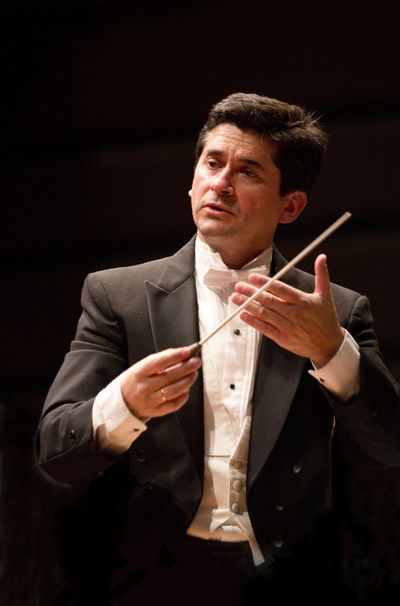Chorale gives symphony a fuller voice

In the latest installment of our ongoing Meet the Musicians series, which focuses on members of the Spokane Symphony, we sat down with Julián Gómez Giraldo, who has directed the Symphony Chorale for the past six years. A native Colombian, Giraldo also serves as director of orchestra at Eastern Washington University.
Depending on the requirements of a given piece, the chorale will feature anywhere between 80 and 120 singers, all of whom are volunteer performers. We spoke with Giraldo and symphony conductor Eckart Preu about the benefits of having a chorale and some of the individual pieces in this weekend’s Classics concert series.
SR: Why is it important for a symphony to have a chorale at its disposal?
Giraldo: This is such a privilege, not only for the community but for the members of the chorale and the orchestra itself. Not all symphonies have the privilege of having a chorale.
Preu: You can expand the repertoire, because there’s so much choral-symphonic work that’s good for the orchestra to play and good for people to hear. All instruments strive to imitate the human voice. … So much of our music is nonverbal – by intention, of course – but if you do make the connection with the written word, music is more realistic. It’s not as abstract.
SR: Francis Poulenc’s Stabat Mater and Mozart’s “Ave Verum Corpus,” which are part of this weekend’s program, prominently feature the chorale. How have you interpreted those pieces?
Preu: Stabat Mater is about the instrument as human voice. It is almost like a church painting set to music.
Giraldo: One of the things that can impact the people that listen to the piece is the connection with the human voice, and then the connection with the text, which is supernatural. It’s just beautiful.
SR: The symphony program says the Mozart piece is often called “the most perfect 46 measures in all Western music.” What’s the significance of that?
Giraldo: I don’t know who said that, but it’s an extraordinary masterpiece, of course. But there are so many perfect pieces in the chorale world, and that is one of them. It’s so moving. It touches you in a manner that not many words can touch you – as a singer, as a conductor, as an audience.
Preu: It’s because it’s so simple and so short. Whenever you think of masterworks, you think of symphony stuff, big stuff. This is kind of miniature. It’s four minutes; it’s nothing. I think the way it’s constructed – the simplicity of it yet the power that’s inherent in it – I think that’s probably why.
Giraldo: The tonality is beautiful, and the accompaniment of the strings makes the piece a little bit more perfect.
Preu: But music’s not really about perfection at all …
Giraldo: Almost perfect.